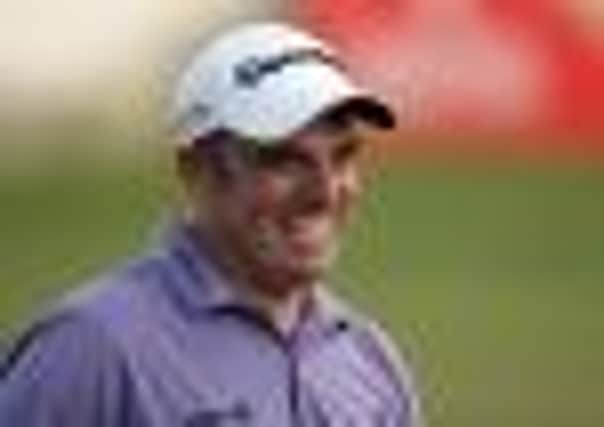McGinley Gleneagles visit ‘huge moment in career’


Paul McGinley was paying his first visit to Scotland since being appointed as the European captain for the return of the Ryder Cup to the home of golf after an absence of 40 years – and there was no disguising what the honour means to him.
His first port of call on arriving in Edinburgh on an early-morning flight from London – Dublin-born McGinley has been a long-time resident in the Sunningdale area – was Bute House, where he received a “warm welcome” from Alex Salmond, the First Minister and a passionate golf enthusiast, as well as a gift of a replica of an 1880 maple-head putter made by St Andrews Golf Company.
Advertisement
Hide AdAdvertisement
Hide AdMcGinley, in the company of Richard Hills, the European Ryder Cup director, then made the hour or so journey north to Gleneagles to start a day-and-a-half long visit that will include him running his eye over the PGA Centenary Course, venue for next year’s match, as well as all the various other parts of the five-star resort which will be involved in hosting the biennial contest.
This morning, he’ll officially unveil the Silver Putter, the event’s equivalent of the Olympic Torch which Salmond was presented with at the closing ceremony at last year’s event in Chicago, while he’ll also be busy with a string of official and corporate engagements.
“It’s exciting to be coming here as Ryder Cup captain,” said McGinley, that smile creasing his face. “It’s the first time I’ve been to Gleneagles when it hasn’t had the stands up, but coming here now is a huge moment in my career. Irrespective of what the result is, this will be a place that is synonymous with me for the rest of my life. Just as The Belfry has become in terms of me holing that winning putt [in 2002], I can feel that sense of connection between me and here for ever more.”
Having played in three winning Ryder Cup teams and also tasted success on two occasions as a vice-captain, McGinley is well aware what’s involved “inside the ropes”. Since his appointment in Abu Dhabi in the middle of last month, however, even he has been surprised by the overall scale of a match that has grown from a fairly low-key affair at Muirfield in 1973 into the third biggest event in sport.
“I’m seeing the grand scale of what a Ryder Cup is and what goes into its organisation – it’s incredible,” he mused. “Someone told me that more than 500 million people watched the press conference when I was announced as captain. That puts it in scale. I mean, you are talking about 250 million watching Real Madrid v Manchester United [in the Champions League a fortnight ago] and then, when you compare it to that announcement, it puts where the Ryder Cup is in perspective of world sport. If that wasn’t a wake-up call, I don’t think anything would be.”
Rory McIlroy, the world No 1, slept through his wake-up call and was lucky to make it on to the first tee for his singles match last year at Medinah, where Europe pulled off a stunning last-day victory. By the sounds of things, McGinley will already have a plan in place to stop anything similar happening on his watch, although the 46-year-old admits he is picking up things all the time that can hopefully add to what he has learned about a captaincy from the likes of Sam Torrance, Bernhard Langer, Ian Woosnan, Colin Montgomerie and Jose Maria Olazabal. “Every night I go to bed thinking about the Ryder Cup and every morning I wake up still thinking about it,” he revealed, with another broad smile.
“I’m so excited about it and I have so many ideas. Even when I’m watching a football match I’m now analysing it in a different way. When I’m reading all the quotes in newspapers, I’m not looking for headlines from players any more. I want to know what the managers are saying. Nearly all of it is not relevant but I do pick up snippets and I have made a number of notes already about extra things I have learned over the last few weeks from watching other sports and listening to managers.”
While McGinley admitted it will be “difficult” to encourage potential team members to play in this year’s Johnnie Walker Championship – the event is not being held in 2014 due to the logistics of staging the Ryder Cup – he will be encouraging them to play the PGA Centenary Course during other visits to Scotland in the next 18 months.
Advertisement
Hide AdAdvertisement
Hide Ad“The more players with experience around the golf course the better, there’s no doubt, and I have a number of ideas that I will be sharing with the players about making Gleneagles a little more familiar to them,” he said.
Europe’s new Ryder Cup captain may still be in the “honeymoon period” when “people are saying really nice things”. He’s long enough in the tooth to know the journey over the next 18 months won’t exclusively be sweetness and light but, in McGinley, Europe’s bid to record a first Ryder Cup win on Scottish soil – a star-studded American side won that last encounter in East Lothian 40 years ago 19-13 – is certainly in good hands.